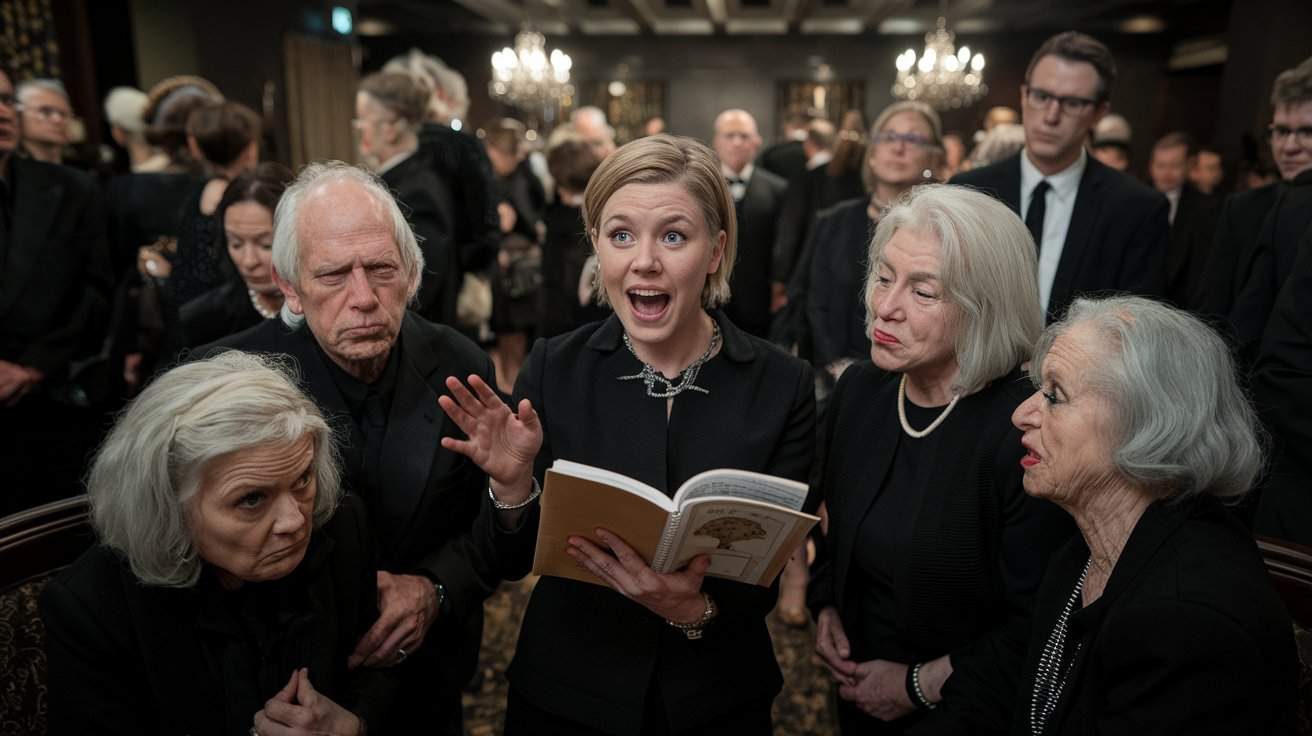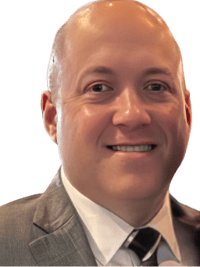Alright, let’s get real for a second. We genealogists? We’re the weirdos at every funeral.
While everyone else is sobbing into handkerchiefs, we’re practically salivating over the treasure trove of family history just waiting to be unearthed.
Our questions? They don’t just raise eyebrows. They make people wish they could crawl into the casket and close the lid.
Our enthusiasm? It’s not just mistaken for insensitivity. It’s mistaken for full-blown psychopathy.
But hey, we can’t help it. While most people inherited Great-Grandpa’s nose or Grandma’s eyes, we inherited their obsessive need to document every sneeze, hiccup, and stubbed toe in the family history.
These 19 statements are sure to cement our reputation as the family’s resident oddballs.
1. “Mind if I snap a quick pic of that headstone?”
Cemeteries aren’t just final resting places. They’re our playgrounds. Our research labs.
We whip out our smartphones. Click. Click. Click.
“You’re photographing graves? At a funeral?”
You bet we are. These inscriptions? They’re not just words carved in stone. They’re clues. Puzzle pieces. The key to unlocking our past.
2. “I’ll need a copy of the death certificate. For my records.”
We’re not being morbid. We’re being thorough.
That death certificate? It’s not just a piece of paper. It’s a goldmine of information. A primary source. The holy grail of genealogical research.
We’ll file it away. Cross-reference it. Add it to our ever-growing database of family facts.
Because in our world, death isn’t the end. It’s just another data point.
3. “I’ve got a DNA kit. Who wants to swab?”
Nothing says “I care” like asking for a DNA sample at a funeral.
It’s not weird. It’s science. It’s history. It’s the key to unlocking our genetic past.
Plus, Great-Aunt Edna isn’t getting any younger. We need to capture that DNA before it’s too late.
4. “Can I see the family Bible? I need to update our mortality records.”
That dusty old book? It’s not just scripture. It’s a treasure trove of family data.
Births. Deaths. Marriages. It’s all there, scribbled in faded ink between passages of Psalms and Proverbs.
We’re not just reading the Bible. We’re reading between the lines. Decoding our family’s past.
5. “Who’s the oldest living relative now?”
Great-Uncle Bob’s passing isn’t just a loss. It’s a shift in our family demographics.
We’re not being insensitive. We’re being scientific. Tracking patterns. Analyzing trends.
Because in our world, every death is a data point. A piece of the puzzle that is our family’s genetic legacy.
6. “Does anyone have photos of the deceased from different decades?”
We’re not just reminiscing. We’re researching.
Those old photos? They’re not just memories. They’re evidence. Clues to our genetic heritage.
We’re tracking wrinkles. Noting hairlines. Analyzing bone structure.
Because in our world, every laugh line tells a story. Every gray hair holds a secret.
7. “Mind if I record the eulogies for our family oral history project?”
We’re not just mourning. We’re documenting.
Those heartfelt words? They’re not just tributes. They’re testimonies. First-hand accounts of our family’s history.
We’re capturing stories. Preserving memories. Building a legacy that will outlive us all.
8. “Can we discuss any hereditary health issues while we’re all here?”
We’re not being nosy. We’re being proactive.
Understanding our ancestors’ health? It’s not just interesting. It’s crucial. It could save lives.
Heart disease? Cancer? Genetic disorders? We need to know. For ourselves. For our children. For generations to come.
9. “I brought my portable scanner. Anyone have old death certificates to share?”
We come prepared. Always.
That crumpled death certificate from 1902? We want it. That faded obituary? Hand it over.
We’re like document vampires. We feed on historical records.
“But it’s a funeral,” they say. Exactly. When else will we have access to all these crucial documents?
10. “Who knows the story behind this family plot?”
We’re not just visiting graves. We’re exploring our roots.
That old family plot? It’s not just a patch of land. It’s a genealogical goldmine.
We’re noting names. Dates. Relationships. Building a map of our family’s final resting places.
Because in our world, even death can’t stop the pursuit of knowledge.
11. “Was the cause of death the same as Great-Grandpa’s? I’m tracking genetic patterns.”
We’re not being morbid. We’re being methodical.
That cause of death? It’s not just a medical term. It’s a clue. A piece of our genetic puzzle.
We’re tracking patterns. Analyzing trends. Building a picture of our family’s health history.
Because in our world, every death holds the key to understanding life.
12. “Can I get everyone’s birthdates before we leave?”
We’re not just making small talk. We’re gathering data.
Those birthdates? They’re not just numbers. They’re data points. Crucial information for our family mortality tables.
We’re calculating lifespans. Analyzing patterns. Predicting trends.
Because in our world, every birthday is a step closer to understanding our family’s longevity.
13. “I’m compiling last words of our ancestors. Any memorable ones from the deceased?”
We’re not just preserving memories. We’re documenting history.
Those final words? They’re not just sentimental. They’re historical. A glimpse into our ancestors’ minds at their most vulnerable moment.
We’re capturing wisdom. Preserving humor. Documenting regrets.
Because in our world, even the end is just another beginning.
14. “Who’s handling the obituary? I have some fascinating ancestral details to add.”
We’re not trying to hijack the obituary. We’re enhancing it.
Those ancestral details? They’re not just trivia. They’re legacy. A way to connect the deceased to generations past and future.
We’re adding context. Providing perspective. Weaving individual lives into the grand tapestry of our family history.
15. “Can we talk about the family’s traditional burial customs?”
We’re not just paying respects. We’re studying anthropology.
Those burial customs? They’re not just rituals. They’re cultural artifacts. Windows into our family’s past.
We’re noting traditions. Analyzing symbolism. Tracing the evolution of our family’s relationship with death.
Because in our world, even funerals are field research.
16. “Is it true that Great-Aunt Mabel was buried with her wedding ring?”
We’re not being ghoulish. We’re being thorough.
That wedding ring? It’s not just jewelry. It’s a historical artifact. A piece of our family’s material culture.
We’re documenting possessions. Analyzing symbolism. Piecing together the story of our ancestors’ lives through the objects they took to their graves.
17. “Did anyone bring the family medical history chart?”
We’re not just mourning. We’re updating our records.
That medical history chart? It’s not just a document. It’s a roadmap. A guide to our family’s health future.
We’re noting symptoms. Tracking diagnoses. Building a comprehensive picture of our genetic health risks.
Because in our world, every illness is a clue to our family’s medical mystery.
18. “Who wants to help me transcribe the epitaphs after the service?”
We’re not avoiding grief. We’re channeling it into productivity.
Those epitaphs? They’re not just stone carvings. They’re primary sources. Valuable data for our family history research.
We’re preserving words. Documenting dates. Capturing the essence of lives lived.
Because in our world, even gravestones are storytellers.
19. “Sorry I’m late, I got sidetracked at the cemetery next door.”
We’re not being disrespectful. We’re being thorough.
That neighboring cemetery? It’s not just another graveyard. It’s an unexplored branch of our family tree.
We’re discovering relatives. Uncovering connections. Expanding our understanding of our family’s geographical spread.
Because in our world, every cemetery is a potential goldmine of genealogical information.
The Method to Our Madness
Look, we know our methods might seem odd. Our timing, questionable. Our enthusiasm, misplaced.
But here’s the truth: We’re not just genealogists. We’re time travelers. Story collectors. Memory keepers.
We’re preserving the past for future generations. Uncovering truths that would otherwise be lost to time.
So the next time you spot someone at a funeral furiously scribbling notes or snapping photos of gravestones, cut them some slack. They’re not being rude. They’re being genealogists.
And who knows? That awkward question about Great-Aunt Mabel’s burial jewelry might just unlock a whole new chapter in your family’s story.



Loved this article and can’t wait to share it with others. I found myself in several of the items on the list.
Loved the article. I take photos at funerals before family and friends arrive. Also, of the sign in book after the service.
You absolutely hit the nail on the head!!!
This article has also given me some more ideas of questions to ask at the next funeral I attend.
This was a really great article & I found myself laughing, as I do or have done, a lot of those things you wrote.
Absolutely fantastic article!
Great article